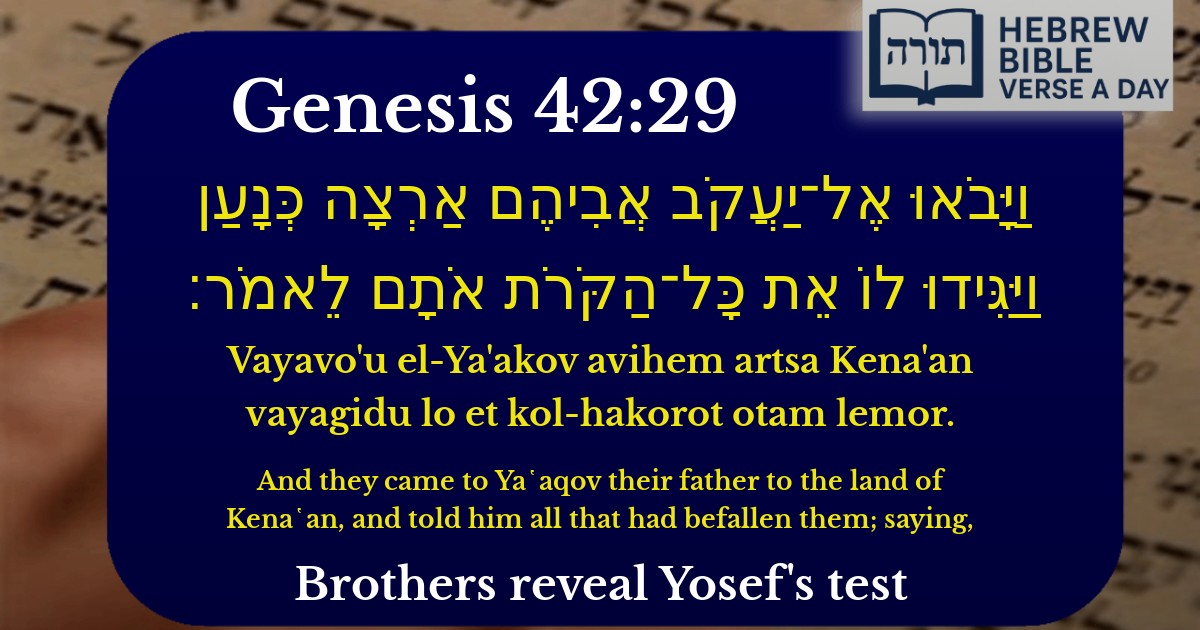Frequently Asked Questions
Q: What does Genesis 42:29 mean?
A: This verse describes how Yosef's brothers returned to their father Yaakov in the land of Canaan and told him everything that had happened to them in Egypt. According to Rashi, this includes their encounter with Yosef (though they didn't recognize him), being accused as spies, and having to bring Binyamin back to prove their honesty.
Q: Why is it important that they told Yaakov 'all that had befallen them'?
A: The Torah emphasizes this detail to show that the brothers were being completely honest with their father at this point, unlike when they deceived him about Yosef years earlier. The Midrash notes this as part of their teshuvah (repentance) process for that earlier sin.
Q: How does this verse connect to the larger story of Yosef and his brothers?
A: This moment is crucial because it sets in motion Yaakov's difficult decision to send Binyamin to Egypt, which leads to the emotional reunion with Yosef. The Ramban explains that all these events were divinely orchestrated to bring about the fulfillment of Yosef's dreams and the Jewish people's descent to Egypt.
Q: What lesson can we learn from this verse today?
A: We learn the importance of honest communication within families. The Talmud (Yevamot 65b) teaches that peace in the home sometimes requires withholding painful truths, but here we see that after years of deception, the brothers chose honesty - showing that truth ultimately strengthens family bonds.
Q: Why does the Torah specify they came to Yaakov in 'the land of Canaan'?
A: Rashi explains this emphasizes they returned to the same place they left from, showing God's protection throughout their journey. The Kli Yakar adds that mentioning Canaan highlights they were still in the Promised Land, contrasting with their upcoming descent to Egypt which would begin the exile foretold to Avraham.


Context in the Narrative
The verse (Bereshit 42:29) describes the return of Yosef's brothers to their father Yaakov in the land of Canaan after their initial encounter with Yosef in Egypt, where they did not recognize him. They recount "all that had befallen them," setting the stage for Yaakov's subsequent reactions and the unfolding drama of the family's reconciliation.
Rashi's Commentary
Rashi explains that the brothers deliberately omitted certain details when speaking to Yaakov to avoid causing him undue distress. Specifically, they did not mention Yosef's accusation that they were spies (Bereshit 42:9) or his demand to bring Binyamin to Egypt (Bereshit 42:15-20). Rashi cites the Midrash (Bereshit Rabbah 91:8) to support this, emphasizing the brothers' sensitivity to their father's emotional state.
Rambam's Perspective on Honesty and Family Dynamics
Rambam (Hilchot De'ot 2:6) discusses the importance of truthful speech but also permits—and sometimes requires—withholding painful truths when they serve no constructive purpose. The brothers' selective reporting aligns with this principle, as full disclosure might have unnecessarily agitated Yaakov.
Midrashic Insights
Ibn Ezra's Linguistic Analysis
Ibn Ezra highlights the phrase "וַיַּגִּידוּ לוֹ" ("and told him"), noting its usage elsewhere in Tanach (e.g., Shemot 19:3) to imply a formal or deliberate communication. Here, it underscores the gravity of the brothers' report and their careful choice of words.
Halachic Implications
The Shulchan Aruch (Choshen Mishpat 422:1) rules that one may withhold information to prevent harm, derived from principles seen in this narrative. The brothers' actions thus serve as a precedent for balancing honesty with compassion in sensitive situations.